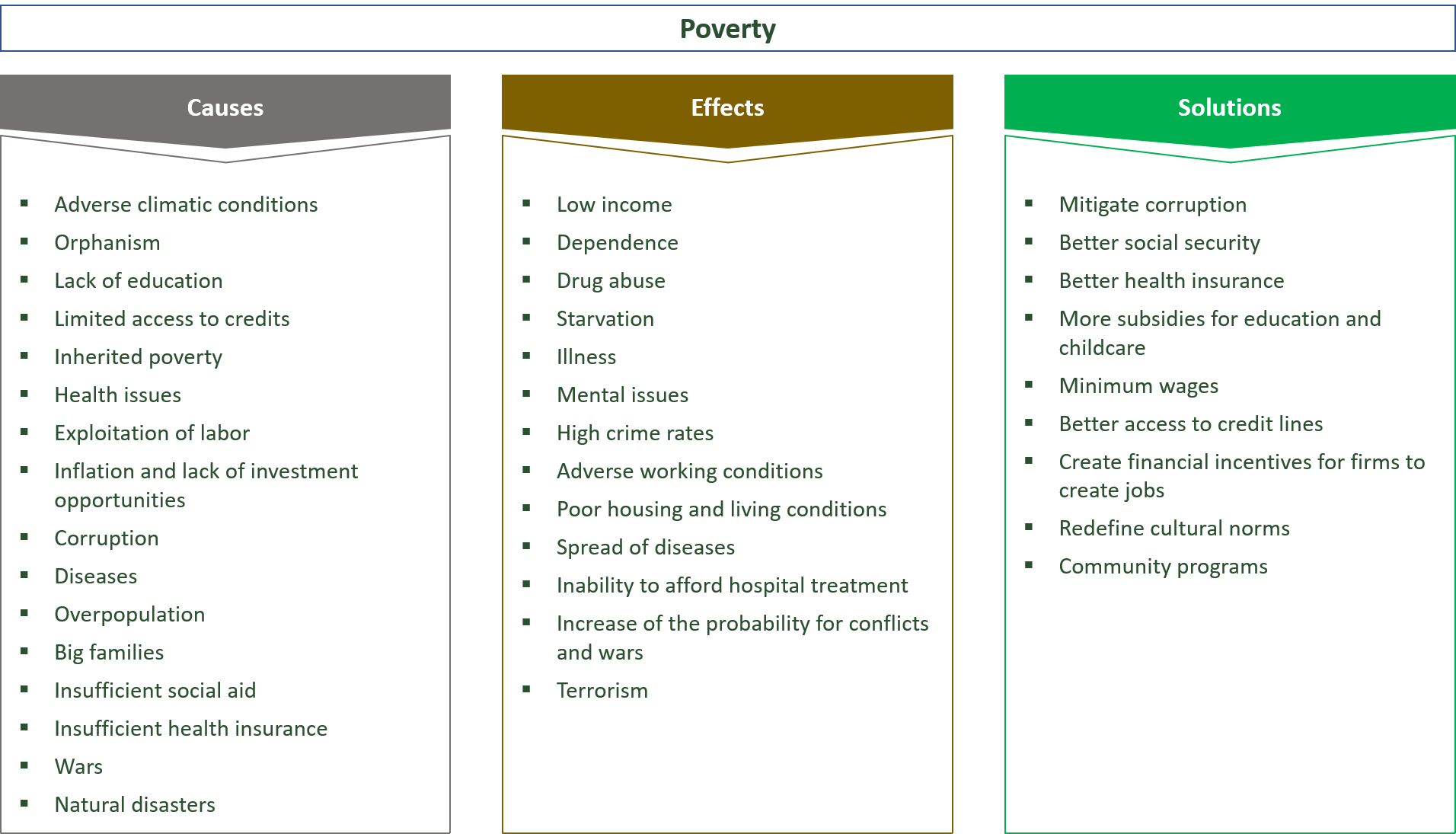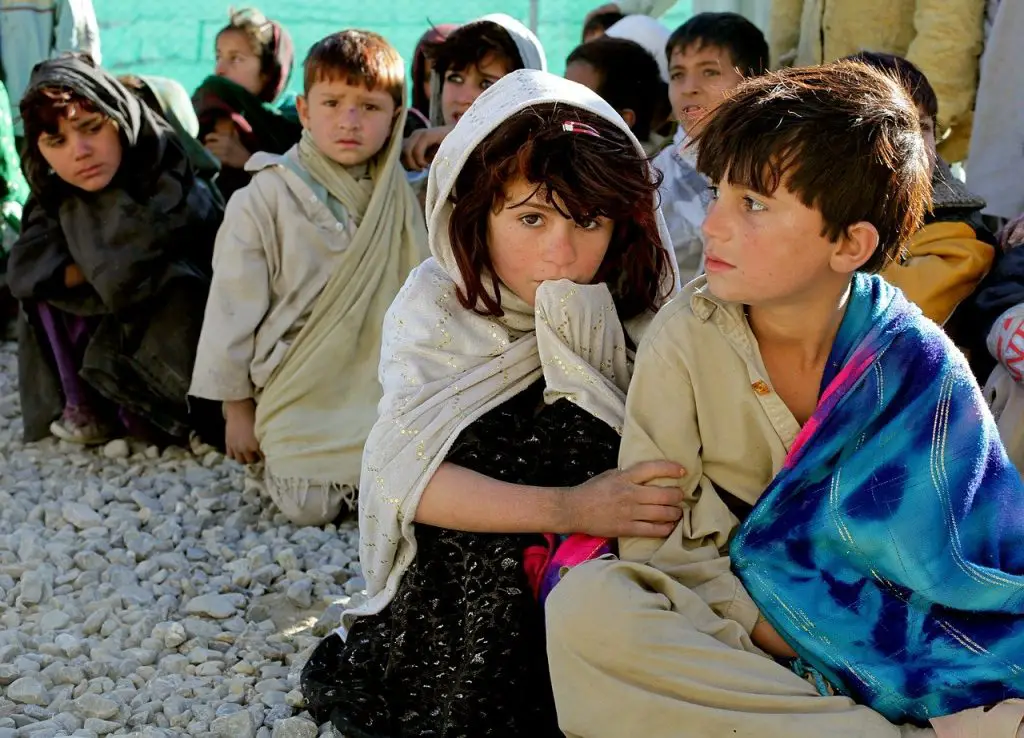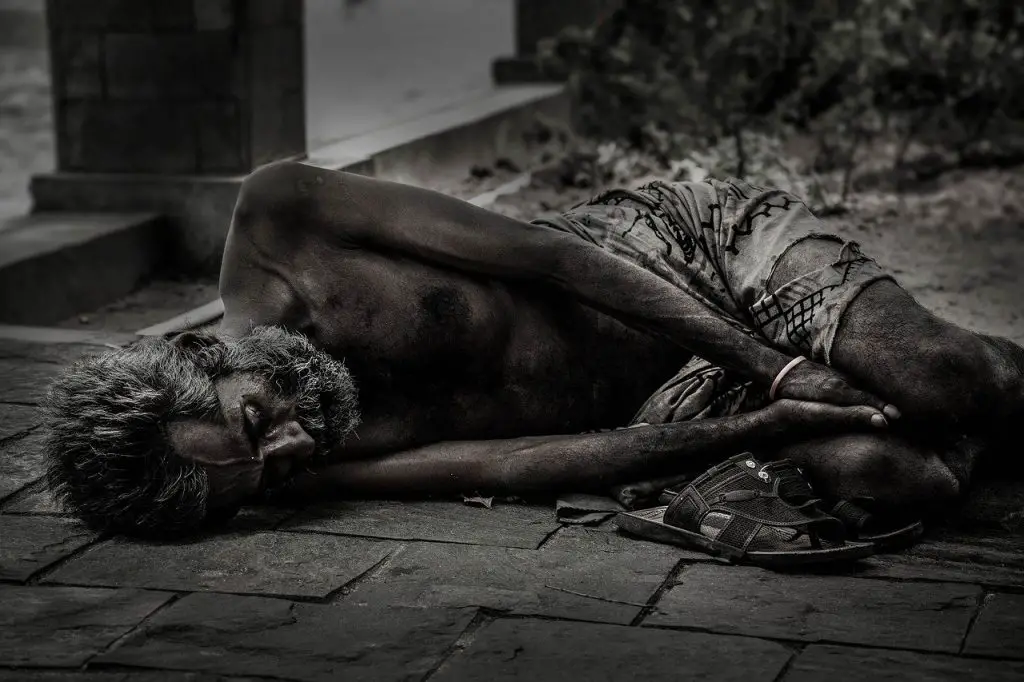“Anyone who has ever struggled with poverty knows how extremely expensive it is to be poor.”
James Baldwin, Novelist
Poverty: Causes, Effects & Solutions

Poverty can be defined as a state in which people are not able to afford enough material goods for their basic needs.
This may include food but also social needs.
Although poverty tends to decrease and has been decreasing over the past decades, it still is a big problem for many people worldwide.
In this article, the causes, effects and solutions for poverty are examined.
Audio Lesson
Contents
Extent and Development of Poverty
Poverty is a severe issue that is present in some countries much more than in others.
In the past decades, poverty has been a big issue for many countries in South-Asia, East Asia and Pacific as well as in Sub-Saharan Africa.
A report of the World Bank shows that poverty in South-Asia and East Asia is likely to decrease substantially until 2030.
However, in Sub-Saharan Africa, poverty will stay quite stable until 2030.
Causes for Poverty
- Low income
- Adverse climatic conditions
- Orphanism
- Lack of education
- Limited access to credits
- Inherited poverty
- Health issues
- Exploitation of labor
- Inflation and lack of investment opportunities
- Corruptive actions
- Diseases
- Overpopulation
- Big families
- Insufficient social aid
- Insufficient health insurance
- Conflicts
- Natural disasters
Low income
A low income is a major cause of poverty.
If you are earning a low income, you will not be able to save money and invest it in order to increase your wealth.
Moreover, in countries with a quite low income, people will often not be able to provide for basic needs like enough food or for the treatment of diseases.
This makes these people even more vulnerable to poverty.
Moreover, if you are poor, your children are more likely to stay poor as well.
Adverse climatic conditions
There are some natural causes for poverty, including adverse climatic conditions like draughts.
Living in regions where droughts are quite usual, people will suffer from poverty and food shortages since they may not be able to tilt their fields due to a lack of water.
Moreover, raising cattle may also not possible due to water shortages.
Thus, people living in areas with adverse climatic conditions are more likely to suffer from poverty.
Orphanism
Another reason for poverty might be orphanism.
Children that grow up without parents are more likely to suffer from mental issues which in turn can translate into an increased likelihood of poverty.
Moreover, since they have no parents who could educate them and show them the “right path”, these children are more likely to engage in crime or other illegal activities which in turn may lead them to end up in prison.
After going to prison, it usually is quite hard to find a job since firms often do not want to employ people with this kind of background.
Thus, orphanism can increase the probability of poverty significantly.
Lack of education
Education is key when it comes to make money and to escape poverty.
The better your education is, the more money you can demand for your services.
However, if your education level is quite low and you do not provide value for firms, your chances to get hired for a well-paying job are quite low since companies usually look out for highly-qualified workers.
In many poor countries, it is quite difficult for children to get proper education and access to technology since for many families, sending their kids to school is too expensive.
Moreover, many children have to work to support their families instead of attending school.
Thus, a lack of education can be a big contributor to poverty.
Limited access to credits
There are many people who would be talented enough to start their own business but will not be able to do so due to a lack of money.
These people often also do not get a credit line since they are not considered to be solvent.
Thus, these people may be trapped in poverty since they do not get funding for starting their own business and therefore escape poverty.
Inherited poverty
There are many studies that show that poverty is often inherited.
This basically means that children from poor families have a much higher probability to also stay poor compared to children from rich families.
This is quite logical since children from poor families often do not get the education necessary to escape poverty.
Moreover, children from poor families often have to take care of their siblings and also work in order to provide for their family members.
In contrast, children from rich families are often able to focus on their education and do not have to care about other things too much.
They are also more likely to get a credit line for starting a business.
Thus, it makes it much more likely to become financially successful when you are lucky enough to be born into a rich family.
Health issues
Health issues can be both a cause as well as an effect of poverty.
Poor people are usually at a higher risk to suffer from health issues due to unhygienic living conditions and also due to malnutrition.
Moreover, in case they get sick, many poor people do not have proper health insurance and may not be able to afford appropriate treatment which can further exacerbate the effects of diseases.
Health issues can be a cause for poverty in the sense that when you have a severe disease, you are no longer able to work and therefore the probability for poverty increases.
Additionally, you may also no longer be able to provide for your family, which not only leads to poverty for yourself, but also puts your family at risk for poverty.
Thus, public health problems can be a serious cause of poverty.
Exploitation of labor
In many poor countries, people rely heavily on their jobs since it is their single source of income.
These people know that if they lose their jobs, they may suffer from starvation and may also not be able to provide for their families anymore.
Thus, this fact makes them quite vulnerable.
Many companies know that locals rely on their jobs which makes it easy for firms to exploit their workers.
Companies will therefore often just pay quite low wages or will offer quite bad working conditions since they know they can force people to work for them due to a lack of alternatives.
Inflation and lack of investment opportunities
In some poor countries, inflation is a big problem.
Inflation means that your money will lose in value.
If there is a high level of inflation, saving money is not a viable option since it will simply lose too much value over time.
Poor people often do not have access to alternative investment opportunities.
Therefore, they are forced to spend their money quite fast if they want to get value from it instead of saving and investing it in later stages.
This also contributes to poverty since these people are not able to invest their money in a sustainable manner.
Corruptive actions
Corruptive activities are a significant problem in many developing countries.
Rich minorities often try to keep their wealth and power and bribe policy-makers and other state officials to act in their favor.
This leads to a high level of wealth for a few individuals but often contributes to significant poverty for the vast majority of a country’s population.
Diseases
Diseases can also lead to poverty since people in poor developing countries often do not have proper health insurance.
If a family member suffers from a serious disease, the treatment costs will be quite high and will impose a large financial burden on the rest of the family.
This may bring the whole family in financial distress and may contribute to poverty for the family members.
Overpopulation
Overpopulation can also be regarded as a significant source of poverty.
Since more people on our planet implies that there are fewer resources per capita, overpopulation may decrease average income levels over time.
Especially for poor countries, overpopulation often is a big issue since the government will not be able to provide social security and proper health insurance for all people since the total costs are simply too high.
Big families
In some cultures, having big families is quite common. Studies have shown that the number of children is strongly positively correlated with poverty.
One reason for this is that for poor people without health insurance or retirement schemes, children are considered as a sort of insurance since they are the only possibility to provide for parents when they get old.
However, a high number of children also means that there are more people to provide for.
This often implies that children, instead of going to school, have to work in factories from a young age on and will lack the education to escape poverty when they turn into grownups.
Thus, a high number of children can also contribute to poverty for the family members.
Insufficient social security
In many poor countries, social security schemes are quite limited or even non-existent.
This means that if people get unemployed, they will not be able to get financial aid and may suffer from starvation.
Out of desperation, this may lead people to work in illegal businesses or work under adverse working conditions which increases the probability of health issues. In turn, these health issues may lead to severe poverty.
Insufficient health insurance
The absence of health insurance is a big problem, especially in poor developing countries.
People will often not be able to afford proper treatment in case of illness.
This may lead to severe health conditions or even to death for many people.
Many people will no longer be able to work due to inappropriately treated health conditions which may in turn translate into poverty since they will no longer be able to earn an income.
Conflicts
Conflicts are a big cause of poverty. Especially in poor countries, people become quite frustrated since they have to live under poor conditions and see no perspective to escape poverty.
This makes people more willing to engage in conflicts since they have nothing to lose.
Wars in turn lead to the destruction of infrastructure and also to injuries for many people.
These injuries will in turn increase the likelihood for people to become poor.
Natural disasters
Natural disasters may also lead to poverty for many people.
Earthquakes and tsunamis often have tremendous adverse effects on the affected regions, which in turn often leads to the destruction of many buildings and to a loss of livelihood for many people.
Locals in these regions will suffer from extreme poverty since on the one hand, their houses have been destroyed and on the other hand, there is no work left from which they could rebuild their houses and start a new life.

Effects of Poverty
- Dependence
- Drug use
- Starvation
- Illness
- Mental issues
- Adverse working conditions
- Poor housing and living conditions
- Spread of diseases
- Inability to afford hospital treatment
- Increase of the probability for conflicts and wars
- Radical movements
Dependence
Poverty often leads to an unhealthy state of dependence.
This could mean the dependence on your parents or also the dependence on a job you hate but have to work in order to provide enough food.
Dependence is always a bad thing for the person who is dependent since these people will likely get exploited by people who have power over them.
Dependence may increase the risk for bullying and bad treatment of people.
Since poor people are more likely to become dependent, poverty can be regarded as a major cause of the dependence of people and the related adverse effects.
Drug use
It has been shown by many studies that the use of legal and illegal drugs is positively correlated with the level of poverty.
This means that if you are poor, the likelihood of drug use increases.
This makes quite a lot of sense since people how are poor are often desperate and try to escape reality by using certain substances.
Moreover, drugs are often the only source of excitement for poor people, which makes drug dependency even more probable.
Although drugs are used in every culture and also among rich people, poor people are at greater risk to become dependent on substances.
Starvation
Starvation and famine are additional effects of poverty.
Poor people with bad or no jobs will often not be able to provide for their families since their income will not be sufficient to buy basic things like enough food and drinks.
The problem of starvation is especially severe in regions with hot and dry climate since in those regions, farming will often not be possible and high unemployment rates will prevail.
Illness
There is a high positive correlation between the level of income and health.
Rich people are able to afford the best treatment and are therefore able to fight diseases much better than poor people who are not able to afford proper treatment.
Moreover, poor people are often more vulnerable to diseases since their immune system is weak due to malnutrition.
Thus, illness is likely to increase with the level of poverty.
Mental issues
Apart from physical issues, poor people often also suffer from mental issues and social isolation.
Imagine you have children but you don’t know how to provide for them since there are no jobs around and you will not be able to make money.
This would be a huge mental burden and you would likely suffer from mental issues due to worries about the overall situation.
Moreover, the lack of perspective for poor people also contributes to mental issues since people are often just desperate and do not see a path to a brighter future.
Adverse working conditions
In poor regions, people often have to work under quite bad working conditions.
Since people rely on their jobs in order to survive, companies can exploit them since they know that people are dependent on their jobs.
This often leads to a state where companies do not care about the well-being or the safety of their workers at all.
Moreover, poor people often suffer from a lack of social security and may therefore have serious trouble if they become unemployed.
Poor housing and living conditions
In poor countries, many people suffer from quite low living standards and also from unhygienic conditions.
Some people do not even have clean drinking water.
Moreover, in some regions, there is not even electricity.
Due to poverty, these people will likely never have the chance to escape these living conditions since they often do not have the money to start a better life abroad.
Some people may even suffer from homelessness due to poverty since they may not be able to afford to rent a flat or a house.
Spread of diseases
In poor countries, diseases can spread much easier since hygienic conditions are usually quite low which gives bacteria a breeding ground.
Moreover, due to malnutrition, people are more likely to get hit by diseases since their immune system will not be able to fight the bacteria effectively.
Thus, poverty can also increase the likelihood of a spread of diseases.
Inability to afford hospital treatment
In case of serious health conditions, poor people are often not able to afford proper treatment in hospitals and rather have to hope and fight the disease at home.
This can lead to severe health issues and even to death from diseases that would not have been too dangerous if treated properly.
Thus, due to poverty, the probability to suffer severe health effects increases dramatically.
Increase of the probability for conflicts and wars
Since poor people are usually more likely to become frustrated, they are more likely to engage in wars or radical populism since they do not have to lose too much.
Hence, people may engage in wars which makes the overall situation even worse since wars cause significant damage to people, but also destroy significant portions of their livelihood.
Radical movements
Radical groups usually try to recruit people who are desperate since these kinds of people are easier to convince to engage in those kinds of activities.
Therefore, it is easier to recruit people in poor regions by promising them a better future.
Once people recognize that engaging in radical activities only worsens their future prospects, it is often too late.
Thus, poverty may also support radical movements.

Solutions for the Poverty Problem
- Mitigate corruptive activities
- Better social security
- Better health insurance
- More subsidies for education and childcare
- Minimum wages
- Better access to credit lines
- Create financial incentives for firms to create jobs
- Redefine cultural norms
- Community programs
Mitigate corruptive activities
One measure to fight poverty is to mitigate corruptive actions since it often leads to excessive wealth for a few people but leads to poverty for the majority of locals.
Governments and local authorities should take serious measures in order to fight this problem.
Better social security
Sufficient social security is crucial in order to fight poverty.
Governments should ensure that people who become unemployed will still be supplied with enough food and other basic things.
By doing so, these people will be able to search for new jobs and will not be pressured into jobs with bad working conditions.
Moreover, social security will not only fight poverty but will also fight crime since people are less likely to engage in criminal activities if they have other options for sufficient income.
Better health insurance
Proper health insurance is vital in order to build wealth and to escape poverty.
Since treatments in hospitals are often quite expensive, people have to be covered through health insurance since they would have large amounts of debt otherwise.
Moreover, many people would also be not able to afford medical treatment at all, which may lead to serious health conditions or even death.
Therefore, high-quality health insurance is crucial to fight poverty and the related adverse effects.
More subsidies for education and childcare
Education is key to escape poverty.
Thus, governments should provide more funds to subsidize education since it is one of the most effective measures to increase wealth for the country but also for individuals.
Minimum wages
Minimum wages are another measure to fight poverty.
Governments should set minimum wages at least at a level that workers are able to afford basic things for daily life.
This also includes being able to pay for proper health insurance and social security.
By doing so, people are covered for the most important basic needs and can try to escape poverty from this point on more effectively.
Better access to credit lines
There are many people who are willing to work hard in order to build their own business.
However, poor people are often seen as not creditworthy enough from the perspective of banks.
Thus, many people will not be able to get a credit line to start their business.
Governments should provide more credit opportunities for those kinds of people in order to give them an opportunity to escape poverty.
Create financial incentives for firms to create jobs
Governments and municipalities should also try to make investments in their countries more attractive.
This could come in the form of low tax rates in order to make it profitable for firms to open branches in poor regions.
More jobs often mean a better chance for people to get out of poverty.
Therefore, governments should create a framework that makes it attractive for companies to create jobs.
Redefine cultural norms
In some cultures, many people are kept poor intentionally.
There is a small elite of people who is quite rich and a majority of people who are considered to kind of serve them.
This system works since people are often kind of brainwashed and see it as their natural destiny to serve.
We have to break these cultural values and make people aware that there is no need to serve other people.
People should be free to abstract from cultural values and to strive for a better future.
Community programs
Engaging in community programs that aim to fight poverty would be another step you could take in order to mitigate the problem.
Even though it is only a small contribution, it could still improve the life of a few people who may be thankful for your support for the rest of their life.
Conclusion
Poverty is a big global problem.
Although there are some global programs in place which aim to fight poverty, there are still many poor people on our planet that really struggle with their poor living conditions.
Fighting poverty is one of our greatest challenges but it is far from impossible.
Even now, we would be able to provide basic care for all people worldwide.
However, the setup is not sophisticated enough yet and there are many frictions in many countries that do not allow to fight poverty in an efficient manner.
Therefore, it is in the responsibility of the rich countries to support poor countries in order to fight poverty and the related adverse effects.
Another alternative approach in order to reduce poverty is the notion of basic income.
If you want to learn more about it, check out the advantages and disadvantages of universal basic income.
Sources
https://en.wikipedia.org/wiki/Poverty
https://www.worldbank.org/en/publication/poverty-and-shared-prosperity
https://mpra.ub.uni-muenchen.de/24871/

About the author
My name is Andreas and my mission is to educate people of all ages about our environmental problems and how everyone can make a contribution to mitigate these issues.
As I went to university and got my Master’s degree in Economics, I did plenty of research in the field of Development Economics.
After finishing university, I traveled around the world. From this time on, I wanted to make a contribution to ensure a livable future for the next generations in every part of our beautiful planet.
Wanna make a contribution to save our environment? Share it!